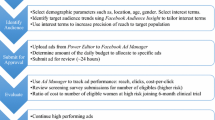Abstract
To our knowledge, ours is the first study to report on Facebook advertising as an exclusive mechanism for recruiting women ages 35–49 years residing in the USA into a health-related research study. We directed our survey to women ages 35–49 years who resided in the USA exclusively using three Facebook advertisements. Women were then redirected to our survey site. There were 20,568,960 women on Facebook that met the eligibility criteria. The three ads resulted in 899,998 impressions with a reach of 374,225 women. Of the women reached, 280 women (0.075 %) clicked the ad. Of the women who clicked the ad, nine women (3.2 %) proceeded past the introductory page. Social networking, and in particular Facebook, is an innovative venue for recruiting participants for research studies. Challenges include developing an ad to foster interest without biasing the sample, and motivating women who click the ad to complete the survey. There is still much to learn about this potential method of recruitment.



Similar content being viewed by others
References
Fox S and Jones S (2009) The social life of health information. Washington, DC: Pew Internet & American Life Project [updated 2009 Jun 11; cited 2011 Apr 5]. Available from: http://www.pewinternet.org/~/media//Files/Reports/2009/PIP_Health_2009.pdf
Madden M and Zickuhr K (2011) 65 % of online adults use social networking sites. Washington, DC: Pew Research Center [updated 2011 Aug 26; cited 2012 Feb 23]. Available from: http://www.pewinternet.org/~/media/Files/Reports/2011/PIP-SNS-Update-2011.pdf
Mychasiuk R, Benzies K (2011) Facebook: an effective tool for participant retention in longitudinal research. Child Care Health Dev
Jones L, Saksvig BI, Grieser M, Young DR (2012) Recruiting adolescent girls into a follow-up study: benefits of using a social networking website. Contemp Clin Trials 33(2):268–272
Bender JL, Jimenez-Marroquin MC, Jadad AR (2011) Seeking support on facebook: a content analysis of breast cancer groups. J Med Internet Res 13(1):e16
Farmer AD, Bruckner Holt CE, Cook MJ, Hearing SD (2009) Social networking sites: a novel portal for communication. Postgrad Med J 85(1007):455–459
Bull SS, Breslin LT, Wright EE, Black SR, Levine D, Santelli JS (2011) Case study: an ethics case study of HIV prevention research on Facebook: the Just/Us study. J Pediatr Psychol 36(10):1082–1092
Abdesslem FB, Parris I, and Henderson T (2010) Mobile experience sampling: reaching the parts of Facebook other methods cannot reach. Presented at: Privacy and usability methods pow-wow (PUMP); Sept 6, 2010; Dundee, UK. Cambridge, UK: University of Cambridge Computer Laboratory; [updated 2010 Sep 6; cited 2012 Jun 11]. Available from: http://www.cl.cam.ac.uk/~fb375/publications/Ben-Abdesslem.PUMP10.pdf
Ryan T, Xenos S (2011) Who uses Facebook? An investigation into the relationship between the Big Five, shyness, narcissism, loneliness, and Facebook usage. Comput Hum Behav 27(5):1658–1664
Jones SC, Magee CA (2011) Exposure to alcohol advertising and alcohol consumption among Australian adolescents. Alcohol Alcohol 46(5):630–637
Williams MT, Proetto D, Casiano D, Franklin ME (2012) Recruitment of a hidden population: African Americans with obsessive–compulsive disorder. Contemp Clin Trials 33(1):67–75
Hoy MG, Milne G (2010) Gender differences in privacy-related measures for young adult Facebook users. J Interact Advert 10(2):28–45
Brickman-Bhutta C (2009) Not by the book: Facebook as sampling frame. University Park, PA: Association of Religion Data Archives [updated 2009 Oct 27; cited 2012 Jun 11]. Available from: www.thearda.com/workingpapers/download/Not%20by%20the%20Book%20-%20Bhutta.doc
Pereyra-Elias R, Mayta-Tristan P (2012) Recruiting researchers through Facebook. Epidemiology 23(3):500
Ramo DE, Hall SM, Prochaska JJ (2010) Reaching young adult smokers through the internet: comparison of three recruitment mechanisms. Nicotine Tob Res 12(7):768–775
Fenner Y, Garland SM, Moore EE, Jayasinghe Y, Fletcher A, Tabrizi SN et al (2012) Web-based recruiting for health research using a social networking site: an exploratory study. J Med Internet Res 14(1):e20
Richiardi L, Pivetta E, Merletti F (2012) Recruiting study participants through Facebook. Epidemiology 23(1):175
Lord S, Brevard J, Budman S (2011) Connecting to young adults: an online social network survey of beliefs and attitudes associated with prescription opioid misuse among college students. Subst Use Misuse 46(1):66–76
Ramo DE, Prochaska JJ (2012) Broad reach and targeted recruitment using Facebook for an online survey of young adult substance use. J Med Internet Res 14(1):e28
de Vries G (2012) Online display ads: the brand awareness black hole. Forbes.com LLC [updated 2012 May 7; cited 2012 Jun 11]. Available from: http://www.forbes.com/sites/ciocentral/2012/05/07/online-display-ads-the-brand-awareness-black-hole/
Acknowledgments
This project was funded by a University of Missouri Research Council grant [URC 11–009 Kapp]. The funding source had no involvement in data collection or interpretation. The content is solely the responsibility of the authors and does not necessarily represent the official views of the University of Missouri. We are grateful to the women who participated in this study and shared their views. We thank Robert Blake, MD from the University of Missouri for his helpful comments on an earlier version of this manuscript.
Author information
Authors and Affiliations
Corresponding author
Rights and permissions
About this article
Cite this article
Kapp, J.M., Peters, C. & Oliver, D.P. Research Recruitment Using Facebook Advertising: Big Potential, Big Challenges. J Canc Educ 28, 134–137 (2013). https://doi.org/10.1007/s13187-012-0443-z
Published:
Issue Date:
DOI: https://doi.org/10.1007/s13187-012-0443-z




